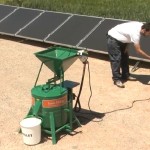Limited or inconsistent access to necessary resources creates many challenges for delivering quality medical care in low- and middle-income countries. These include funding and revenue, skilled clinical and allied health professionals, administrative expertise, reliable community infrastructure (eg water, electricity), functioning capital equipment and sufficient surgical supplies. Despite these challenges, some surgical care providers manage to provide cost effective, high quality care, offering lessons not only for other low- and middle-income countries but also for high-income countries that are working towards increasing value-based care. Examples would be how to optimise the consumption of resources, and reduce the environmental and public health burden of surgical care.
Owing to the liberal utilisation of capital equipment and single-use supplies, surgical care in high-income countries is increasingly recognised as a significant source of greenhouse gases and other environmental impacts that adversely affect human health. Regulations require many potentially reusable supplies and drugs to be discarded after single use. Supply manufacturers may label drugs or products as single-use to increase profit, reduce liability or facilitate regulatory approval. Many high-income countries struggle to increase the value of care while maximising quality and outcomes, and minimising cost and resource use.
For most high-income countries, cataract surgery is the highest volume and most expensive surgical procedure (in aggregate) in all of medicine. Studies analysing global cataract care found few differences in outcomes, such as surgical infection, despite large differences in carbon footprint and cost. A single cataract procedure in the UK emits an estimated 180kg CO2e (carbon dioxide equivalents) whereas the same surgery with similar outcomes in India emits only 6kg CO2e, 5% of that in the UK.
Source: Steyn, A., et al. “Frugal innovation for global surgery: leveraging lessons from low-and middle-income countries to optimise resource use and promote value-based care.” The Bulletin of the Royal College of Surgeons of England 102.5 (2020): 198-200. [open access]










